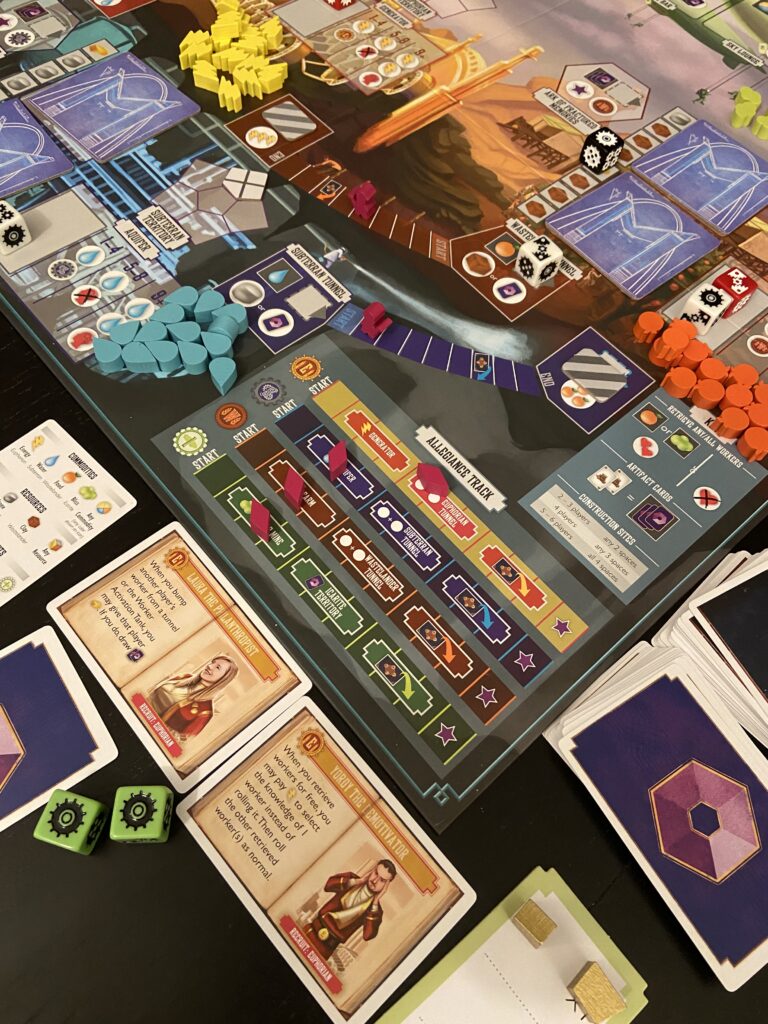This is a series of posts where I play 100 boardgames.

Game: Euphoria: Build a Better Dystopia
Designer: Jamey Stegmaier & Alan Stone
Year: 2013
Country: U.S.A.
Publisher: Stonemaier Games
It’s interesting to compare Viticulture and Euphoria: Build a Better Dystopia from Stonemaier Games. Both are worker placement games and clearly share the same DNA, but in terms of design and conception Euphoria feels like it purposefully seeks to overcome many of the qualities Viticulture seemed to have inherited from eurogames in general.
The most immediately visible of these developments is that Euphoria has an interesting, darkly humorous theme. At the start of the game you recruit two followers, named characters with cards of their own. One of the ones I had was a “Demotivator”, in case the workers become excessively motivated.
Euphoria is set in a dystopian city somewhat reminiscent of Bioshock: Infinite. You have people living in the clouds and below the earth, each with access to their own resources. Your workers are represented by dice, and you throw them to see their mental capacity. If it’s too high, they’ll figure out the deal is rotten and leave. That’s why it’s always great if they’re dumb as rocks.
There’s a special track keeping score of worker knowledge and the higher it gets, the more likely it is that your workers leave you. That’s why you aim to keep it as low as possible.
Euphoria has a narrative frame suggesting that you realized that you’d been sold a utopia but in reality the city fell far short of that. Instead of leaving, you stayed to build and change things. But during gameplay, I started to feel that I was not an idealistic reformer at all. I was a middle manager in an exploitative system, seeking to squeeze more out of my recalcitrant workers.
The game has moral choice cards which you can resolve instead of taking a turn, such as the one I resolved by taking a baseball bat to an oppressor. But this felt less like an ideological statement than a feeble attempt to salvage a sense of self as a moral person while enforcing an oppressive system.
This discrepancy between rhetoric and the actual experience of playing the game was interesting, underlining that what the players did was not change a dystopia into a utopia, but “Build a Better Dystopia”. So, still a dystopia, and furthermore, better for who?
Many games of this genre seem to involve complicated victory point trackers where you only figure out at the end of the game who really won. Euphoria is delightfully simple in this regard, giving you a pool of stars you can assign around the board as your workers complete relevant tasks. The first player to get rid of all their stars wins immediately.
Structurally, the game had three phases: At the start, as often happens in worker placement games, you figure out how to get resources and improve your basic resource gathering engine. In Euphoria, the need to put all your energies into getting those extra workers was tempered by the fact that you could lose them if they got too smart.
The middle phase involved developing a series of marketplaces, which required all players to contribute with their workers. It brought an element of collaboration to an otherwise competitive game, and we figured quickly that you wanted to be in on all these deals. Then after the marketplaces are complete, the players scramble to get rid of their last remaining stars and someone wins.